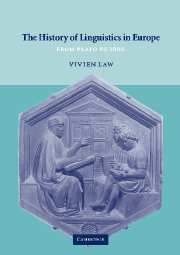Book contents
- Frontmatter
- Dedication
- Contents
- List of illustrations
- List of maps
- List of boxes
- Preface
- 1 Getting ready to study the history of linguistics
- 2 Greek philosophy and the origins of western linguistics
- 3 Towards a discipline of grammar: the transition from philosophy
- 4 From literacy to grammar: describing language structure in the ancient world
- 5 Christianity and language
- 6 The early Middle Ages
- 7 The Carolingian Renaissance
- 8 Scholasticism: linking language and reality
- 9 Medieval vernacular grammars
- 10 The Renaissance: discovery of the outer world
- 11 A brief overview of linguistics since 1600
- 12 Becoming a historian of linguistics
- Research resources in the history of linguistics
- Notes
- Index
3 - Towards a discipline of grammar: the transition from philosophy
Published online by Cambridge University Press: 05 March 2015
- Frontmatter
- Dedication
- Contents
- List of illustrations
- List of maps
- List of boxes
- Preface
- 1 Getting ready to study the history of linguistics
- 2 Greek philosophy and the origins of western linguistics
- 3 Towards a discipline of grammar: the transition from philosophy
- 4 From literacy to grammar: describing language structure in the ancient world
- 5 Christianity and language
- 6 The early Middle Ages
- 7 The Carolingian Renaissance
- 8 Scholasticism: linking language and reality
- 9 Medieval vernacular grammars
- 10 The Renaissance: discovery of the outer world
- 11 A brief overview of linguistics since 1600
- 12 Becoming a historian of linguistics
- Research resources in the history of linguistics
- Notes
- Index
Summary
The Stoics
Out of the Greeks' tireless questioning of everything around them grew the discipline of philosophia. It is hardly right to think of it as a unitary discipline, and still less to equate it with our modern philosophy, for the philosophia of the Greeks subsumed many disparate areas of knowledge. In the generations after Aristotle, countless thinkers took up the task of working through the wealth of ideas inherited from the Golden Age of Athens (box 3.1). Work of two kinds lay before them: systematisation and taking stock, and elaboration of the original often concisely expressed and sketchily developed ideas. Amongst the people who participated in this activity were the members of the most famous philosophical school in the ancient world, the Stoics. Founded by Zeno of Citium in the third century BC, and based as much in Asia Minor (modern Turkey) as in Greece, the Stoics grew in numbers and reputation, even counting a Roman emperor, Marcus Aurelius (121–180 AD), amongst their later adherents. Despite the esteem in which they were held in their own time, almost none of their writings have survived; they are known to us only from the snippets quoted by other writers, and from a sort of biographical dictionary, Lives of the Philosophers, compiled by Diogenes Laertius in the first half of the third century AD. For the historian of linguistics this is an intensely frustrating state of affairs, for, as we shall see, there is reason to suppose that the Stoics played a part in giving shape to the discipline of grammar.
- Type
- Chapter
- Information
- The History of Linguistics in EuropeFrom Plato to 1600, pp. 38 - 51Publisher: Cambridge University PressPrint publication year: 2003

